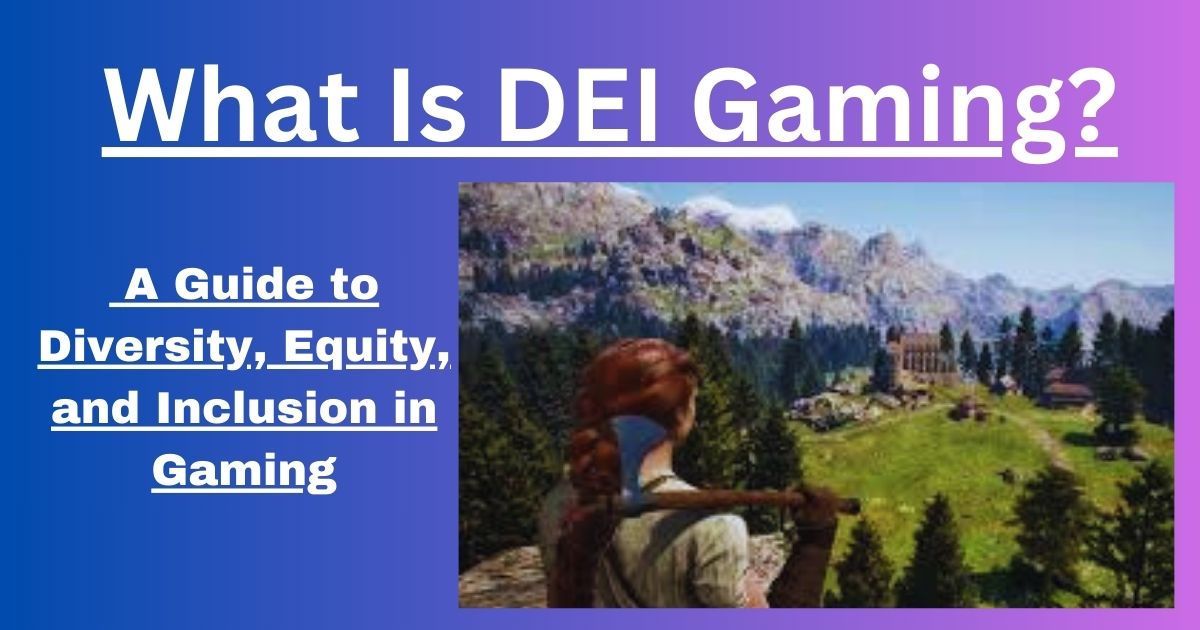In the ever-evolving world of video games, a new acronym has been making waves: DEI. But what exactly is DEI gaming, and why is it becoming increasingly important in the industry? In this comprehensive guide, we’ll dive deep into the world of diversity, equity, and inclusion in gaming, exploring its significance, challenges, and the positive impact it’s having on the gaming landscape. Read Also

Understanding DEI in Gaming
What Does DEI Stand For?
Before we delve into the specifics of DEI gaming, let’s break down what DEI actually means:
- D – Diversity: Recognizing and valuing the differences among individuals, including but not limited to race, ethnicity, gender, age, sexual orientation, and abilities.
- E – Equity: Ensuring fair treatment, access, opportunity, and advancement for all people in the gaming industry and gaming communities.
- I – Inclusion: Creating environments where all individuals feel welcomed, respected, supported, and valued to fully participate.
The Importance of DEI in the Gaming Industry
Gaming has become a global phenomenon, with players from all walks of life enjoying this interactive form of entertainment. However, for many years, the industry has struggled with issues of representation and inclusivity. DEI gaming aims to address these challenges and create a more welcoming space for everyone.
The Current State of Diversity in Gaming
Demographics of Gamers
Gone are the days when gaming was considered a niche hobby for young males. Today, the gaming population is incredibly diverse:
- According to recent studies, nearly 50% of gamers are female.
- The average age of gamers is now in the mid-30s.
- Gamers come from various ethnic backgrounds and cultures.
Representation in Game Development
While the player base has diversified, the same cannot always be said for the game development industry:
- Women make up only about 24% of the game development workforce.
- People of color are often underrepresented in leadership positions.
- LGBTQ+ individuals face challenges in finding inclusive work environments.
The Benefits of DEI Gaming
Improved Creativity and Innovation
When game development teams are diverse, they bring a wealth of perspectives and experiences to the table. This diversity can lead to:
- More innovative game concepts
- Richer storytelling
- Unique problem-solving approaches
Expanded Market Reach
By creating games that appeal to a wider audience, companies can:
- Tap into new markets
- Increase their player base
- Boost revenue and profitability
Enhanced Player Experience
DEI gaming isn’t just about representation; it’s about creating better games for everyone:
- More relatable characters and storylines
- Improved accessibility features
- A welcoming community for all players
Challenges in Implementing DEI in Gaming
Overcoming Stereotypes and Biases
The gaming industry has long been plagued by stereotypes about who a “real gamer” is. Overcoming these biases requires:
- Education and awareness programs
- Challenging harmful tropes in game narratives
- Promoting diverse role models in the industry
Addressing Toxic Gaming Culture
Unfortunately, some gaming communities have developed reputations for hostility and discrimination. Tackling this issue involves:
- Implementing stronger moderation policies
- Encouraging positive player interactions
- Creating safe spaces for marginalized groups
Increasing Diversity in Game Development
To truly change the industry, we need more diverse voices in the creation process:
- Offering mentorship programs for underrepresented groups
- Providing scholarships and educational opportunities
- Implementing inclusive hiring practices
DEI Initiatives in the Gaming Industry
Company-Led Programs
Many major game companies have launched DEI initiatives:
- Ubisoft’s “Women’s Voices in Gaming” program
- Microsoft’s Gaming for Everyone initiative
- EA’s Inclusion Framework
Industry Organizations and Non-Profits
Several organizations are dedicated to promoting DEI in gaming:
- Women in Games International (WIGI)
- Black Girls Code
- AbleGamers Charity
Diversity-Focused Gaming Events
Events that celebrate diversity in gaming are becoming more common:
- GaymerX
- Different Games Conference
- Game Devs of Color Expo
The Role of Game Design in DEI
Character Representation
Creating diverse and well-rounded characters is crucial:
- Avoiding stereotypes and tokenism
- Developing complex backstories for characters of all backgrounds
- Offering customization options that reflect real-world diversity
Inclusive Storytelling
Games have the power to tell compelling stories that resonate with a wide audience:
- Exploring themes from various cultural perspectives
- Addressing social issues in thoughtful ways
- Celebrating diversity through in-game narratives
Accessibility Features
Making games playable for everyone is a key aspect of inclusion:
- Implementing colorblind modes
- Offering subtitles and closed captions
- Providing options for difficulty adjustment
The Impact of DEI on Gaming Communities
Fostering Inclusive Online Spaces
Creating welcoming environments for all players is essential:
- Implementing robust reporting systems for harassment
- Promoting positive community guidelines
- Celebrating diversity through in-game events and activities
Esports and Competitive Gaming
The world of competitive gaming is also embracing DEI:
- Establishing all-women leagues to promote female representation
- Creating scholarships for underrepresented groups in esports
- Implementing diversity quotas in professional teams
Streaming and Content Creation
Diverse content creators are changing the face of gaming media:
- Platforms promoting streamers from underrepresented groups
- Increased visibility for LGBTQ+ gamers
- Collaborative events that highlight diverse voices
The Future of DEI Gaming
Technological Advancements
Emerging technologies are opening new doors for inclusion:
- VR and AR experiences that simulate diverse perspectives
- AI-driven character creation for more realistic representation
- Adaptive controllers for players with different abilities
Educational Initiatives
Preparing the next generation of diverse game developers:
- STEM programs focused on game development for underrepresented youth
- Partnerships between game companies and educational institutions
- Mentorship programs pairing industry veterans with newcomers
Policy and Regulation
The gaming industry may see more formal DEI requirements:
- Government initiatives to promote diversity in tech industries
- Industry-wide standards for inclusive practices
- Transparency reports on diversity and inclusion efforts
How Players Can Support DEI Gaming
Mindful Consumption
Players can make a difference through their purchasing decisions:
- Supporting games that prioritize diversity and inclusion
- Seeking out titles from diverse development teams
- Providing feedback to companies about DEI efforts
Community Engagement
Being an ally in gaming communities is crucial:
- Speaking out against discrimination and harassment
- Participating in diversity-focused gaming events
- Sharing and amplifying diverse voices in gaming discussions
Educating Others
Spreading awareness about DEI gaming:
- Sharing resources on the importance of diversity in gaming
- Engaging in respectful discussions about representation
- Challenging misconceptions about who “belongs” in gaming spaces
Conclusion
DEI gaming is not just a trend; it’s a necessary evolution of the industry. By embracing diversity, equity, and inclusion, the gaming world can create better experiences for all players, foster innovation, and build a more welcoming community. As we’ve explored in this guide, the benefits of DEI extend far beyond just representation—they shape the very future of gaming itself.
Whether you’re a player, developer, or industry professional, there’s a role for everyone in promoting DEI in gaming. By working together, we can create a gaming landscape that truly reflects the diversity of its global audience and pushes the boundaries of creativity and inclusivity.
FAQs
- Q: What does DEI stand for in gaming?
A: DEI stands for Diversity, Equity, and Inclusion. In gaming, it refers to efforts to create a more inclusive and representative industry and community. - Q: How does DEI benefit the gaming industry?
A: DEI benefits the gaming industry by fostering innovation, expanding market reach, improving player experiences, and creating more welcoming communities. - Q: What is DEI detected in games?
A: “DEI detected” typically refers to the recognition or implementation of diversity, equity, and inclusion elements within a game’s content, characters, or development process. - Q: Are there any successful DEI gaming initiatives?
A: Yes, many companies have launched successful DEI initiatives, such as Microsoft’s Gaming for Everyone program and Ubisoft’s Women’s Voices in Gaming. - Q: How can I support diversity in gaming as a player?
A: Players can support diversity by purchasing games from diverse developers, speaking out against discrimination in gaming communities, and participating in DEI-focused gaming events. - Q: What is the difference between diversity and inclusion in gaming?
A: Diversity refers to the representation of various groups, while inclusion focuses on creating environments where all individuals feel welcomed and valued. - Q: How is the esports industry addressing DEI?
A: Esports is addressing DEI through initiatives like all-women leagues, diversity scholarships, and promoting diverse talent in broadcasts and teams. - Q: What role does accessibility play in DEI gaming?
A: Accessibility is a crucial aspect of inclusion, ensuring that games can be enjoyed by players with different abilities through features like adaptive controllers and customizable settings. - Q: Are there any organizations dedicated to promoting DEI in gaming?
A: Yes, organizations like Women in Games International, Black Girls Code, and AbleGamers Charity are dedicated to promoting DEI in the gaming industry. - Q: How can game developers incorporate DEI into their projects?
A: Developers can incorporate DEI by creating diverse characters, telling inclusive stories, implementing accessibility features, and fostering diverse development teams.
I hope you are having a wonderful day.


